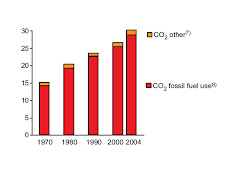skip to main |
skip to sidebar
I read the IPCC's (Intergovernmental Panel on Climate Change) report for 2006. I looked at the general data section for my I-Search last year. Now, on the IPCC's website, they have the newest report. There are three different major subjects: "The Physical Science Basis," "Impacts, Adaptation, and Vulnerability," and "Mitigation of Climate Change." Although I am planning on including a brief overview of global warming in my I-Search, the last two sections seem most relevant to my question. For each separate report, there are separate citations. This post is for the link to these reports. I will include other posts for each report.
This web page has many links that will lead me to a lot more information. But, generally, this site has a lot of data on the relationship between culture and climate change. There is recent climate news, articles, what people can do, what people are doing, and numerous essays and journals. This main page also describes why it is vital for people to act now.
"Global warming kills 160,000 a year already." This fact is another reason that will compel people to make a difference. This number will most certainly increase as the global temperature rises. Not only is the environment at risk, but our health is too. As global warming becomes more prevalent, people will realize that, if they don't make changes to their lives, their family and homes will be at risk.
From this page, I was able to navigate to Milan's U.N. Climate Change web page. This is more of a governmental/business/economic approach to my question. It talks about different countries and what each is doing/has done. The title on the top of this page is "The climate change negotiations as seen through the reaction to Mad Cow disease in the U.S.A." Threats to livestock and agriculture are provoking conferences . This is a very important fact, and helps me narrow down to an answer for my question.
This source gave me a general idea of what is taking for people to change their habits. First, the article talks about government policies. "The round-table members said the new Conservative government is already heading in the right direction to follow its recommendations to reduce Canada's greenhouse gas emissions by 60 per cent by 2050 through existing and emerging technologies without hurting the economy." This action will encourage people to make a difference and act. I think this is going to be a major point in my I-Search. New laws and government awareness is going to be one of the biggest reasons for people to become motivated. Another major point in this article is that Canadians deeply care about their natural surroundings. "The environment is something that Canadians care deeply about." People begin to act when something they love is at risk. For Canadians, this 'something' is nature. The Canadian population is willing to change their lifestyles in order to preserve what they love. This article has taught me that leadership and personal risk are going to be part of the motivation for people to fight climate change. This is a very important point.





